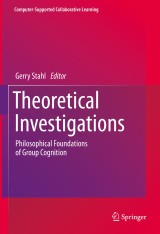Details

Theoretical Investigations
Philosophical Foundations of Group CognitionComputer-Supported Collaborative Learning Series, Band 18
|
160,49 € |
|
| Verlag: | Springer |
| Format: | |
| Veröffentl.: | 23.04.2021 |
| ISBN/EAN: | 9783030491574 |
| Sprache: | englisch |
Dieses eBook enthält ein Wasserzeichen.
Beschreibungen
<div><p></p><p>Computers have transformed how we think, discuss and learn—as individuals, in groups, within cultures and globally. However, social media are problematic, fostering flaming, culture wars and fake news. This volume presents an alternative paradigm for computer support of group thinking, collaborative learning and joint knowledge construction. This requires expanding concepts of cognition to collectivities, like collaborative groups of networked students. </p><p><i>Theoretical Investigations</i> explores the conditions for group cognition, supplying a philosophical foundation for new models of pedagogy and methods to analyze group interaction. Twenty-five self-contained investigations document progress in research on computer-supported collaborative learning (CSCL)—both in Stahl’sown research and during the first decade of the CSCL journal.</p><p>The volume begins with two new reflections on the vision and theory that result from this research. Representing both ethnomethodological and social-constructivist research paradigms, the investigations within this volume comprise a selection of seminal and influential articles and critical commentaries that contribute to an understanding of concepts and themes central to the CSCL field. The book elaborates an innovative theory of group cognition and substantiates the pedagogical potential of CSCL. </p><p> </p><p><i>Theoretical Investigations: </i><i>Philosophical Foundations of Group Cognition </i>is essential as a graduate text for courses in educational theory, instructional design, learning and networked technologies. The investigations will also appeal to researchers and practitioners in those areas. </p><p></p></div>
Part I - Theory: Broadening the scope of CSCL.- Chapter 1: A relational, indirect and meso level approach to CSCL design in the next decade.- Chapter 2: Technology affordances for intersubjective meaning making: A research agenda for CSCL.- Chapter 3: Recalibrating reference within a dual-space interaction environment.- Chapter 4: How to bring a technical artifact into use: A micro-developmental perspective.- Chapter 5: Instrumental genesis in technology-mediated learning: From double stimulation to expansive knowledge practices.- Chapter 6: A systemic and cognitive view on collaborative knowledge building with wikis.- Chapter 7: ncing understanding using Nonaka's model of knowledge creation and problem-based learning.- Part II - Methodology: Analyzing the mechanisms of CSCL.- Chapter 8: Group practices.- Chapter 9: Book review: Exploring thinking as communicating in CSCL.- Chapter 10: The joint organization of interaction within a multimodal CSCL medium.- Chapter 11: Analyzing group coordination when solving geometry problems with dynamic-geometry software.- Chapter 12: Time is precious: Variable- and event-centred approaches to process analysis in CSCL research.- Chapter 13: The multi-layered nature of small-group learning: Productive interactions in object-oriented collaboration.- Part III - Practices: Innovative applications of CSCL.- Chapter 14: Productive failure in CSCL groups.- Chapter 15: Real-time mutual gaze perception enhances collaborative learning and collaboration quality.- Chapter 16: Advancing knowledge building discourse through judgments of promising ideas.- Chapter 17: The Singapore experience: Synergy of national policy, classroom practice and design research.<p></p> <p> </p> <p> </p> <p></p> <p></p>
Dr. Gerry Stahl taught human-computer interaction (HCI), computer-supported collaborative learning (CSCL), computer-supported cooperative work (CSCW) and social informatics (SI) at Drexel University from 2002-2014. He is trained in computer science, artificial intelligence, social philosophy, cognitive science and learning science, with a research approach in theory building, system development and empirical studies of software usage. A world-class researcher in CSCL, he has developed software systems and prototypes to explore support for collaborative learning and to develop the theory of CSCL. In addition to organizing international conferences and authoring over 300 professional publications and presentations, he published three major books based on his research in the Virtual Math Teams Project (VMT). He directed the VMT research project from 2003-2014 in collaboration with the Math Forum and Rutgers-Newark, with about $6 million in NSF funding. He is the founding editor-in-chief of the International Journal of Computer-Supported Collaborative Learning (IJCSCL).
<div><p>Computers have transformed how we think, discuss and learn—as individuals, in groups, within cultures and globally. However, social media are problematic, fostering flaming, culture wars and fake news. This volume presents an alternative paradigm for computer support of group thinking, collaborative learning and joint knowledge construction. This requires expanding concepts of cognition to collectivities, like collaborative groups of networked students. </p><p><i>Theoretical Investigations</i> explores the conditions for group cognition, supplying a philosophical foundation for new models of pedagogy and methods to analyze group interaction. Twenty-five self-contained investigations document progress in research on computer-supported collaborative learning (CSCL)—both in Stahl’s own research and during the first decade of the CSCL journal.</p><p>The volume begins with two new reflections on the vision and theory that result from this research. Representing both ethnomethodological and social-constructivist research paradigms, the investigations within this volume comprise a selection of seminal and influential articles and critical commentaries that contribute to an understanding of concepts and themes central to the CSCL field. The book elaborates an innovative theory of group cognition and substantiates the pedagogical potential of CSCL. </p><p> </p><p><i>Theoretical Investigations: </i><i>Philosophical Foundations of Group Cognition </i>is essential as a graduate text for courses in educational theory, instructional design, learning and networked technologies. The investigations will also appeal to researchers and practitioners in those areas. </p><p></p></div><p></p><p></p>
Presents important papers from the first decade of the International Journal of Computer-Supported Collaborative Learning Highlights seminal theory, methodology, and practices through detailed discussion on broadening the scope of CSCL Applies with vital breadth and centrality to students, researchers, and practitioners working in educational theory
Diese Produkte könnten Sie auch interessieren:

The Professional Education and Development of Teachers of Mathematics

von: Ruhama Even, Deborah Loewenberg Ball

96,29 €

Challenging Mathematics In and Beyond the Classroom

von: Edward J. Barbeau, Peter J. Taylor

149,79 €














